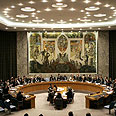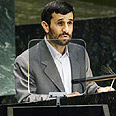New UN sanctions against Iran would require countries to ban the entry of individuals involved in the Iranian nuclear program — a step up from a previous call for vigilance over their travel, according to a document obtained Friday.
The latest round of penalties would also for the first time ban trade in equipment and technology that can be used in both civilian and nuclear programs, according to elements that would form the basis of a new UN resolution.
It would call on countries to inspect cargo heading to or from Iran "provided there are reasonable grounds to believe" that prohibited goods are being transported, the document obtained by The Associated Press said.
The five veto-wielding members of the council — the US, Britain, France, China and Russia — along with Germany, agreed this week on the basic terms of the resolution. Diplomats have said the full, 15-nation Security Council will likely approve it next month.
Freezing assets
The six global powers offered Iran a package of economic incentives and political rewards in June 2006 if it agreed to freeze uranium enrichment before talks on its nuclear program. But Iran has refused despite two previous sets of UN sanctions.
The new proposal would freeze the assets of additional individuals and entities involved in Iran's nuclear activities that were not identified.
It calls on all countries "to exercise vigilance" in entering into new financial commitments with Iran, including the granting of export credits, guarantees or insurance. It also calls for "vigilance" over financial dealings with Iranian-based banks, "in particular with Bank Melli and Bank Saderat, and their branches and subsidiaries abroad."
The new proposal would require all countries to ban the entry or transit of individuals involved in Iran's nuclear program, including procurement activities.
For the first time, it would also target equipment and technology that can be used in both civilian and nuclear programs, except under IAEA auspices and "for exclusive use in light water reactors" provided advance notice is given to the UN committee monitoring sanctions.
Dialogue with Iran to continue
The draft elements stress that the six countries "are willing to take further concrete measures on exploring an overall strategy of resolving the Iranian nuclear issue through negotiation on the basis of their June 2006 proposals."
It encourages EU foreign policy chief Javier Solana "to continue communication with Iran ... with a view to create necessary conditions for resuming talks."
The draft welcomes the agreement between Iran and the UN's International Atomic Energy Agency to resolve all outstanding issues concerning its nuclear program "and progress made in this regard."
It calls for a report from IAEA chief Mohamed ElBaradei in 90 days on Iran's compliance with the council demand to suspend enrichment and says the council will consider "further appropriate measures" if Tehran fails to comply.

















